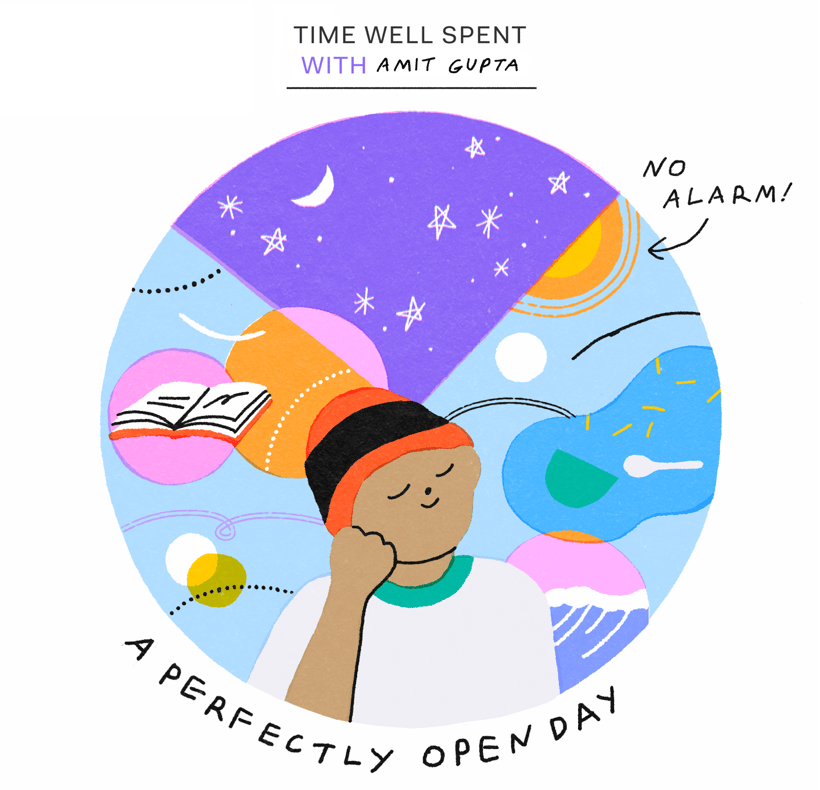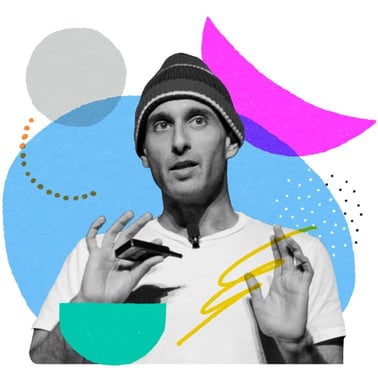Amit Gupta is a science-fiction writer who writes optimistic fiction about the future. He’s currently building Sudowrite, an AI-based tool that helps writers brainstorm, find flow, and imagine new storylines. Amit is also known for his work as an entrepreneur, designer, and founder of Photojojo, a popular photography newsletter and website that he sold in 2014, on the heels of a life-threatening diagnosis and the healing that followed.
We spoke with Amit about life beyond illness, the possibilities of the multiverse, and the beauty of a wide open day.
Amit, what draws you to the timescapes of science fiction?
I grew up reading science fiction. Sci-fi, then and now, explores society’s issues using settings remote enough from our everyday that they evade our automatic judgments. It imagines different ways the world could be while challenging our expectations of how humanity might thrive (and cope) in those situations. We need this stuff!
As a kid, sci-fi got me excited to go out into the world and invent new things. To make the technology in those stories real. So much of what we have today and what’s coming next — from smartphones to space flight to self-driving cars — owes its origins to authors imagining the future.
But something’s changed. When you read or watch sci-fi today, there’s a dystopian edge to it. There are good reasons to question technology. But I fear we’ve slid too far to the dark side.
If all we read and see is how tech is going to enslave us, what will inspire the next generation to create the tech that frees and empowers us? We need to see both sides.
That’s why I’m writing science fiction. I can see how bright the future is, and I want to help others see it, too.
“I can see how bright the future is, and I want to help others see it, too.”
“How Did It Feel to Be Eaten?” is a sci-fi short story you wrote that melds technology and the transcendent, with an expansive sense of time and life cycles. There’s a line about a character who had lived hundreds of times and yet “...it had made the suffering no more bearable. And no less instructive.”
As someone who has weathered your own hard times, what’s your personal philosophy on how the difficult moments of life can be both a source of suffering and enlightenment?
I’m obsessed with the concept of living multiple lives and with the idea of the multiverse. It finds its way into my fiction often.
When I got leukemia in 2011, the timeline branched for me. In one timeline, I went on living in San Francisco, building this fun little company that was my life, eating burritos, hanging out and joking with friends.
But in the new timeline, the one I’m living in today, I spent months in a hospital bed being pumped full of chemo and feeling more pain than I’d ever felt before, unsure if I’d ever get to leave. Thousands of people rallied around me and literally saved my life — they found me stem cells that gave me someone else’s DNA and immune system. I was given 50/50 odds of surviving the next five years. When I walked out of the hospital months later, weak and hobbled, I was forever changed.
I couldn’t get my old life back if I wanted; it didn’t fit anymore. But I was gifted a new one.
I can tell you those were the most painful months of my life, but I can’t feel the suffering anymore. I can’t claim that almost dying enlightened me, but I can assure you that it was the best thing that has ever happened to me. I know I’m in the right timeline.
We’re weird adaptable creatures, aren’t we?
“We’re weird adaptable creatures, aren’t we?”
Nearly a decade has passed since your brush with death, a story you told in your captivating talk at the 2015 XOXO Festival. How has this experience changed your relationship to time?
I came out of the hospital with a list of things I’d always wanted to do, terrified of being back in the hospital in a year or two with regrets. So I got going. I sold my company. I adopted a dog. I bought a motorcycle and took a trip across the country. I did more inner work and I traveled to a ton of places on my bucket list.
I devoted myself full-time to living as if I was on borrowed time.
Then five years came and went and I was still here. My odds improved dramatically. That’s when things changed. It’s easy to answer the question, “How would you spend your time if you only had a few years left?” It’s much, much harder when you don’t know how much time you’ve got. Of course, that’s most of us.
The most fundamental change is that I no longer act like my time’s infinite. That’s our default mindset, but it’s a lie. I only have so many hours or days with my parents or my dog left. I can only read so many more books. I only get so many more Thanksgivings, or surf sessions, or birthdays, or phone calls with friends. So I’d better choose what matters to me.
Whatever time I have left, I have to “own” it.
“It’s easy to answer the question, “How would you spend your time if you only had a few years left?” It’s much, much harder when you don’t know how much time you’ve got. Of course, that’s most of us.”
How do you approach making good use of your time?
I have friends who help hold me accountable, who question me. I have recurring reminders to check in and make sure my routines are serving me and not the other way around. I pay attention to whether I’m happy, energized, or need a change. And I try to address those things. It’s work. That’s all on the micro level.
On the macro level, I do a review at the end of each year. I go through my calendar, my to-do list, and my photos, and make one list of all the things that were peak experiences and another of all the things that were low points. Then I set a reminder for those lists to pop-up every month so I remember to schedule the things that I loved and say no to the rest.
I also have a small group of close friends that are radically transparent about health, habits, work, love, insecurities, relationships, wealth, everything. We each do weekly updates in Google Docs and quarterly and year-end presentations to give feedback to each other. It’s shown me my blind spots and patterns and instigated many difficult changes in how I spend my life’s time.
What’s one non-negotiable thing you always make space for in your life? What’s something you’d like to do less of?
Five or six years ago I started exercising every day. Doesn’t matter if it’s a run or a swim or some bodyweight in a hotel room or a quick 7-minute workout. I have to do something. I only skip it if I’m sick or traveling. I don’t feel sane without it.
Similarly, I arrange my life so I almost never have to set an alarm clock. Sleep affects my mood and my mind so dramatically, it’s never worth sacrificing for me. (But I don’t have kids. Maybe I’d sing a different tune if I did.)
I’ve realized there is a point where I’m over-optimizing. One of my goals for 2021 is to make more mistakes: in relationships, in how I spend money, and in how I spend my time. I hope these mistakes will open me to the unexpected.
What happens to time when you’re in the state of flow? And what are you most likely doing?
I love flow! I want more flow! Why is flow so elusive?!
I used to find myself in flow quite easily when I was running my company Photojojo. I’d be doing design work or plumbing the depths of a model in a spreadsheet, and I’d be deeply, deeply lost in it. I loved that feeling.
But writing is another story. Starting over, learning a new career, at the bottom of the ladder, I often struggle! I so want that feeling of flow back.
Actually, that’s why my collaborator and I are working on Sudowrite. It’s a writing tool made to help writers maintain flow. If you get stuck and can’t figure out what comes next, it’ll offer five suggestions, all written in your voice and style. If the scene you’re in feels stale, it’ll give you specific ideas for how to change it up. It’s like having a creative brainstorming buddy by your side 24/7.
What are your favorite pieces of writing about time?
I’d love to share two of my favorite pieces of speculative fiction. One of my favorite short stories is “The Egg” by Andy Weir. Freely available online and incredibly short, it gives the reader a fresh, quirky perspective on our time here on Earth.
In a similar vein, my favorite novel is the little-known Replay by Ken Grimwood. I read this at Seth Godin’s suggestion while I was in the hospital with leukemia. I’ve read it three more times since and gifted it to several friends. Every time I read it, it inspires me to live a more interesting and varied life. There’s so much we can do with our time here!
“My perfect day is an empty schedule. I can’t paint what I want if my canvas already has marks on it.”
Imagine you’re reflecting at the end of a day or another period of time where you felt that your time was well spent. What did you do? How did it feel? How much time did you spend doing it?
I woke up without an alarm clock, when my body felt rested and I felt ready. My day was wide open with no appointments, no meetings. The rest of it almost doesn’t matter.
But let’s say as the day unrolled, I moved from activity to activity without calendar or expectations forcing the way. I cooked my own meals. Perhaps I meditated and did some mobility work. I worked on a short story and picked off some tasks on Sudowrite. Maybe I saw or called a friend. If the swell was in, I took a solo surf or met friends on the waves. Maybe I took a walk with a call or an audiobook. And around 10pm, I got in bed with a book.
My perfect day is an empty schedule. I can’t paint what I want if my canvas already has marks on it.



